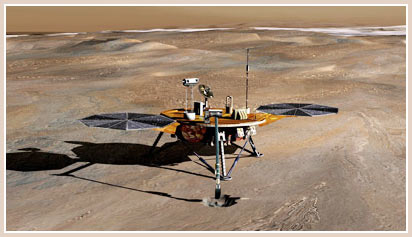NASA lost contact with the Mars probe
Phoenix, the ship that has found evidence of the existence of water on Mars, has lost contact with the NASA command center and its five-month mission is ending.
Experts from the US Aerospace Agency (NASA) predict that Phoenix will stop contacting Earth when it is frozen by the winter on Mars. But this device suddenly stops contacting after a dust storm that makes it impossible to get sunlight to generate electricity.
Phoenix was launched in August 2007 and landed in a northernmost area of Mars in May 2008. It is in search of water and life support conditions on the red planet. The last signal ship to Earth on November 2. NASA said it will try to contact the device in three weeks, but said that the exploration campaign worth $ 475 million is considered to be over.

Phoenix probe ship.(Photo: news.sky.com)
" At this point we have ended our exploration efforts. We will constantly detect Phoenix radio signals, but don't expect to get in touch with it, " said Barry Goldstein, project director of ship exploration. Phoenix, said yesterday.
Phoenix has discovered signs of water existence after analyzing several soil samples on Mars. The ship also sent more than 25,000 photos to Earth. By the end of October this year, Phoenix had been operating for more than two months. The control center has turned off the heating and some devices to save energy for the probe.
Phoenix is the sixth probe to successfully land on Mars and is the first device to safely land down on one of the two poles of the red planet.
- NASA lost the Mars probe
- The US abandoned the Mars probe
- NASA lost contact with the Mars explorer car $ 400 million
- NASA revealed the mission of the next Mars probe
- Mars probe MGS does not respond to the signal
- If a 'million dollar' satellite suddenly disappears, what will NASA do?
- The Global Mars Surveyor is missing due to human error
- NASA launched the Mars probe
- Mars exploration robots will land harassment
- NASA is about to launch a ship to study the Martian atmosphere
- NASA will launch more probes on Mars
- Curiosity is about to drill a third nose on Mars
 Van Allen's belt and evidence that the Apollo 11 mission to the Moon was myth
Van Allen's belt and evidence that the Apollo 11 mission to the Moon was myth The levels of civilization in the universe (Kardashev scale)
The levels of civilization in the universe (Kardashev scale) Today Mars, the sun and the Earth are aligned
Today Mars, the sun and the Earth are aligned The Amazon owner announced a secret plan to build a space base for thousands of people
The Amazon owner announced a secret plan to build a space base for thousands of people